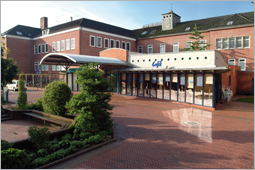German satellite for University of Groningen
The University of Groningen is opening an auxiliary branch in the Marien Hospital in Papenburg (Germany). The University hopes that the satellite will accentuate and intensify cooperation with the border region. ‘We have a close and well-established relationship with Germany, which started with our first rector, Ubbo Emmius. Furthermore, we welcome large numbers of German students to our University every year’, says Sibrand Poppema, President of the Board of the University. ‘Our social role does not suddenly stop at the German border. Our aim is to power innovation in the North-German region and boost relations with the business sector.’

On Tuesday 17 September 2013 in Groningen, in the presence of the Mayors of Papenburg and Dörpen and the Chair of the Marien Hospital Board, agreements were made to open an auxiliary branch of the University of Groningen in Papenburg in the near future. ‘It will initially be a relatively small operation’, says Sibrand Poppema. The Groningen satellite will gradually be expanded under the watchful eye of Papenburg psychotherapist and RUG alumnus Harald Orfgen. ‘One of our ambitions is to see whether we can roll out the large-scale population study ‘LifeLines’, run by the UMCG, in Germany’, continues Poppema. A successful feasibility study has already been carried out.
The German parties appeared highly satisfied with their new cooperation partner. An academic institute will give the region important added impetus. In return, The University of Groningen sees opportunities to launch and develop partnerships with the business sector. The University already works with the Meyer shipyard in Papenburg and is keen to explore opportunities for acquiring research funding in Germany.| Last modified: | 06 September 2021 2.46 p.m. |
More news
-
13 May 2024
Trapping molecules
In his laboratory, physicist Steven Hoekstra is building an experimental set-up made of two parts: one that produces barium fluoride molecules, and a second part that traps the molecules and brings them to an almost complete standstill so they can...
-
29 April 2024
Tactile sensors
Every two weeks, UG Makers puts the spotlight on a researcher who has created something tangible, ranging from homemade measuring equipment for academic research to small or larger products that can change our daily lives. That is how UG...
-
16 April 2024
UG signs Barcelona Declaration on Open Research Information
In a significant stride toward advancing responsible research assessment and open science, the University of Groningen has officially signed the Barcelona Declaration on Open Research Information.
